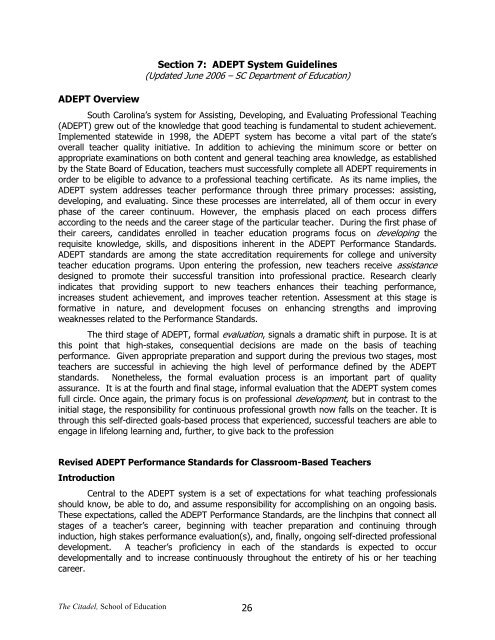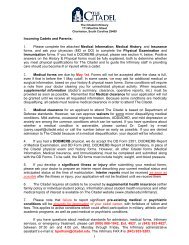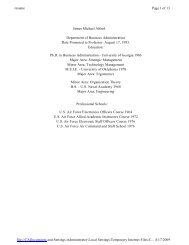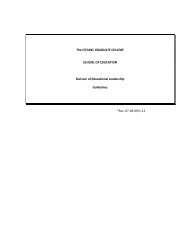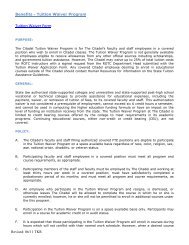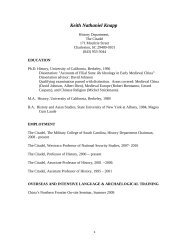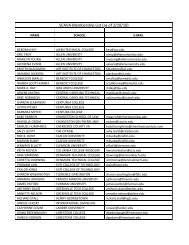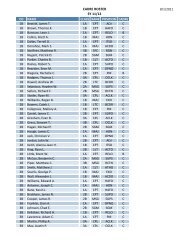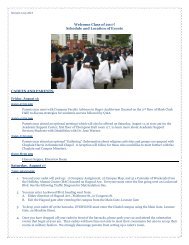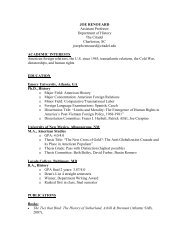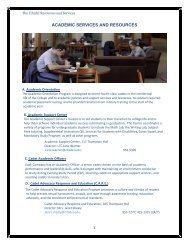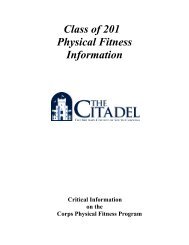Guidelines for Student Teaching Internship - The Citadel
Guidelines for Student Teaching Internship - The Citadel
Guidelines for Student Teaching Internship - The Citadel
You also want an ePaper? Increase the reach of your titles
YUMPU automatically turns print PDFs into web optimized ePapers that Google loves.
ADEPT OverviewSection 7: ADEPT System <strong>Guidelines</strong>(Updated June 2006 – SC Department of Education)South Carolina’s system <strong>for</strong> Assisting, Developing, and Evaluating Professional <strong>Teaching</strong>(ADEPT) grew out of the knowledge that good teaching is fundamental to student achievement.Implemented statewide in 1998, the ADEPT system has become a vital part of the state’soverall teacher quality initiative. In addition to achieving the minimum score or better onappropriate examinations on both content and general teaching area knowledge, as establishedby the State Board of Education, teachers must successfully complete all ADEPT requirements inorder to be eligible to advance to a professional teaching certificate. As its name implies, theADEPT system addresses teacher per<strong>for</strong>mance through three primary processes: assisting,developing, and evaluating. Since these processes are interrelated, all of them occur in everyphase of the career continuum. However, the emphasis placed on each process differsaccording to the needs and the career stage of the particular teacher. During the first phase oftheir careers, candidates enrolled in teacher education programs focus on developing therequisite knowledge, skills, and dispositions inherent in the ADEPT Per<strong>for</strong>mance Standards.ADEPT standards are among the state accreditation requirements <strong>for</strong> college and universityteacher education programs. Upon entering the profession, new teachers receive assistancedesigned to promote their successful transition into professional practice. Research clearlyindicates that providing support to new teachers enhances their teaching per<strong>for</strong>mance,increases student achievement, and improves teacher retention. Assessment at this stage is<strong>for</strong>mative in nature, and development focuses on enhancing strengths and improvingweaknesses related to the Per<strong>for</strong>mance Standards.<strong>The</strong> third stage of ADEPT, <strong>for</strong>mal evaluation, signals a dramatic shift in purpose. It is atthis point that high-stakes, consequential decisions are made on the basis of teachingper<strong>for</strong>mance. Given appropriate preparation and support during the previous two stages, mostteachers are successful in achieving the high level of per<strong>for</strong>mance defined by the ADEPTstandards. Nonetheless, the <strong>for</strong>mal evaluation process is an important part of qualityassurance. It is at the fourth and final stage, in<strong>for</strong>mal evaluation that the ADEPT system comesfull circle. Once again, the primary focus is on professional development, but in contrast to theinitial stage, the responsibility <strong>for</strong> continuous professional growth now falls on the teacher. It isthrough this self-directed goals-based process that experienced, successful teachers are able toengage in lifelong learning and, further, to give back to the professionRevised ADEPT Per<strong>for</strong>mance Standards <strong>for</strong> Classroom-Based TeachersIntroductionCentral to the ADEPT system is a set of expectations <strong>for</strong> what teaching professionalsshould know, be able to do, and assume responsibility <strong>for</strong> accomplishing on an ongoing basis.<strong>The</strong>se expectations, called the ADEPT Per<strong>for</strong>mance Standards, are the linchpins that connect allstages of a teacher’s career, beginning with teacher preparation and continuing throughinduction, high stakes per<strong>for</strong>mance evaluation(s), and, finally, ongoing self-directed professionaldevelopment. A teacher’s proficiency in each of the standards is expected to occurdevelopmentally and to increase continuously throughout the entirety of his or her teachingcareer.<strong>The</strong> <strong>Citadel</strong>, School of Education 26


